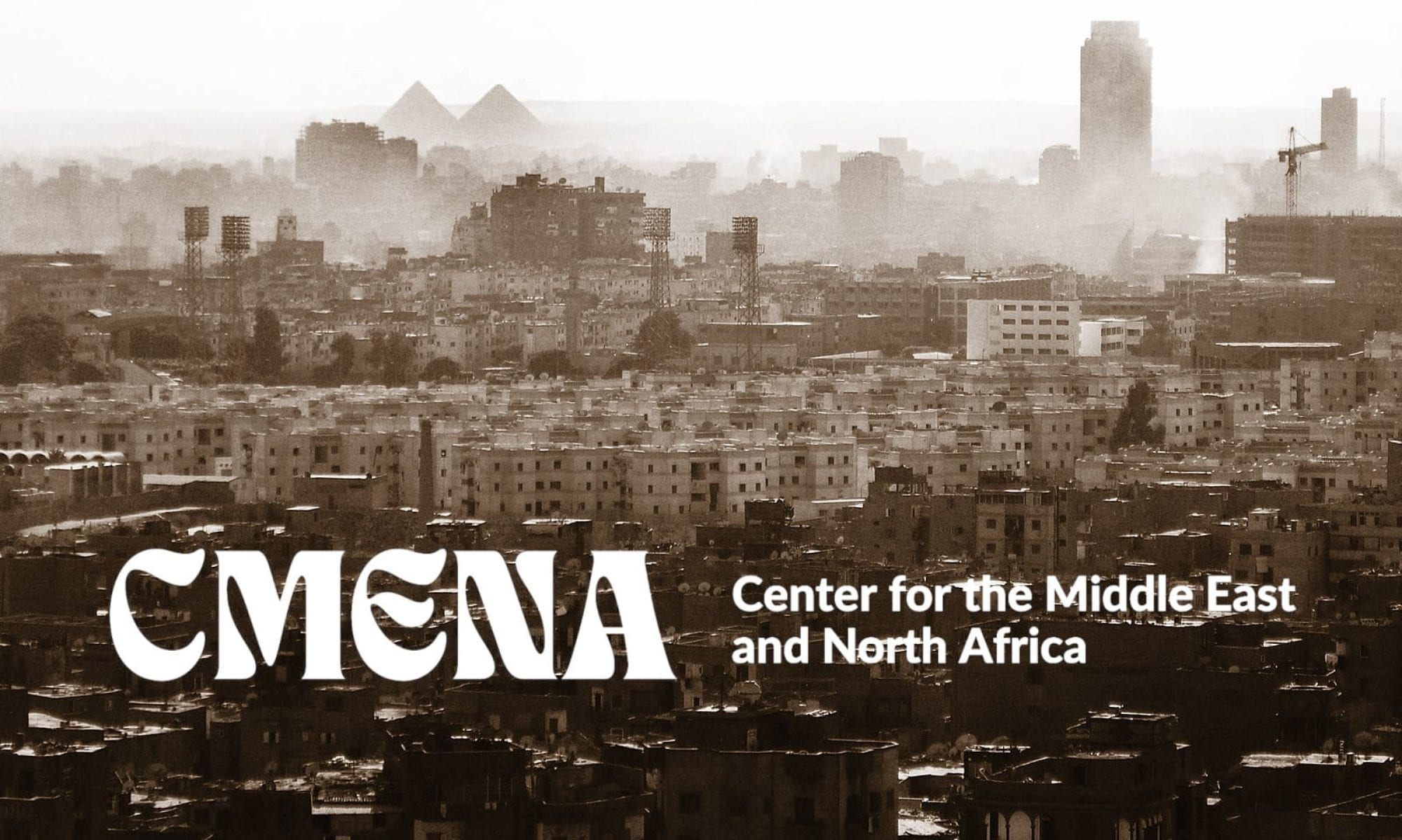Recent Books By Faculty
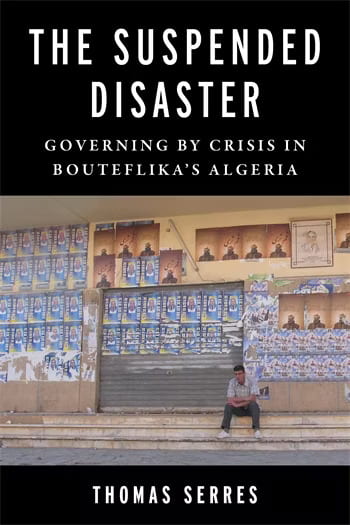
Thomas Serres. The Suspended Disaster: Governing by Crisis in Bouteflika’s Algeria. Columbia University Press, 2023.
After Algeria’s president Abdelaziz Bouteflika announced his intention to run for a fifth term in early 2019, a popular peaceful uprising erupted calling for change. Bouteflika, who had been in office since 1999, was eventually forced to resign, but the Hirak (“movement”) continued to protest the country’s inequalities and entrenched ruling elite.
The Suspended Disaster examines the dynamics of the Algerian political system, offering new insights into the last years of Bouteflika’s rule and the factors that shaped the emergence of an unexpected social movement. Thomas Serres argues that the Algerian ruling coalition developed a mode of government based on the management of a seemingly never-ending crisis, marked by an obsession with security and the ever-present possibility of unrest, violence, and economic collapse. Based on extensive fieldwork and theoretically novel, The Suspended Disaster sheds new light on the political, economic, and social processes underlying an uprising that changed the face of Algerian politics. Read more here.
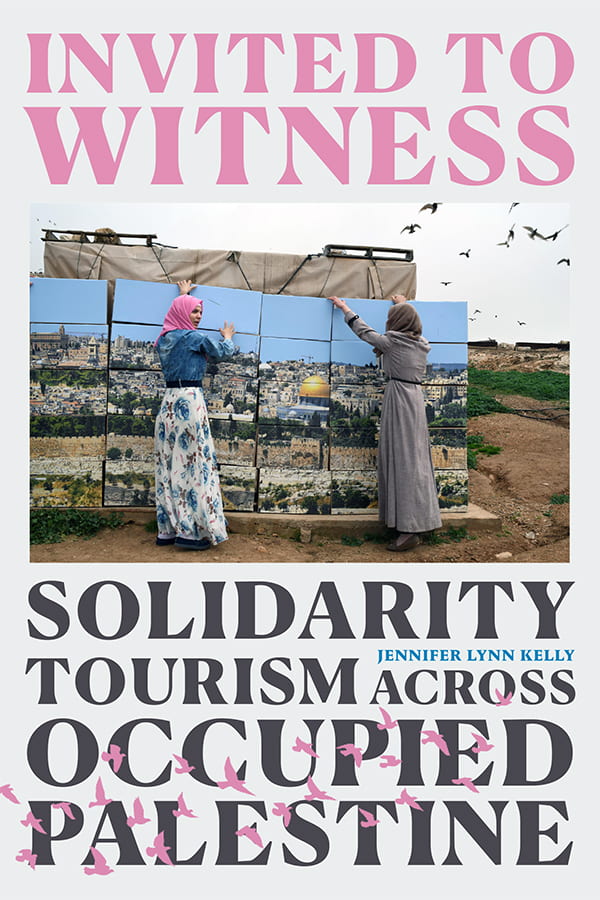
Jennifer Lynn Kelly. Invited to Witness: Solidarity Tourism Across Occupied Palestine. Duke University Press, 2023.
In Invited to Witness, Jennifer Lynn Kelly explores the significance of contemporary solidarity tourism across Occupied Palestine. Examining the relationships among race, colonialism, and movement-building in spaces where tourism and military occupation operate in tandem, Kelly argues that solidarity tourism in Palestine functions as both political strategy and emergent industry. She draws from fieldwork on solidarity tours in Palestine/Israel and interviews with guides, organizers, community members, and tourists, asking what happens when tourism is marketed as activism and when anticolonial work functions through tourism. Palestinian organizers, she demonstrates, have refashioned the conventions of tourism by extending invitations to tourists to witness Palestinian resistance and the effects of Israeli state practice on Palestinian land and lives. In so doing, Kelly shows how Palestinian guides and organizers wrest from Israeli control the capacity to invite and the permission to narrate both their oppression and their liberation.
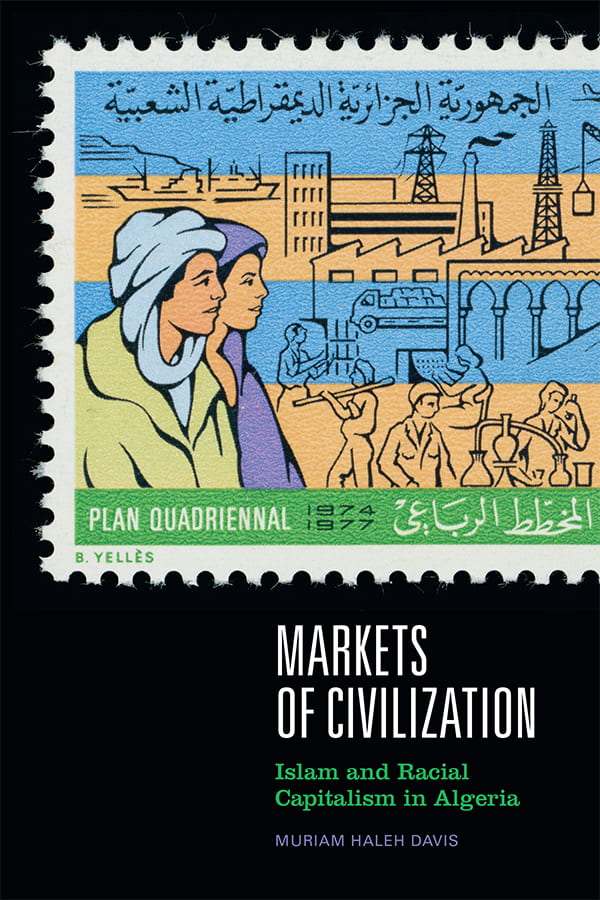
Muriam Haleh Davis. Markets of Civilization: Islam and Racial Capitalism in Algeria. Duke University Press, 2022.
In Markets of Civilization Muriam Haleh Davis provides a history of racial capitalism, showing how Islam became a racial category that shaped economic development in colonial and postcolonial Algeria. French officials in Paris and Algiers introduced what Davis terms “a racial regime of religion” that subjected Algerian Muslims to discriminatory political and economic structures. These experts believed that introducing a market economy would modernize society and discourage anticolonial nationalism. Planners, politicians, and economists implemented reforms that sought to transform Algerians into modern economic subjects and drew on racial assumptions despite the formally color-blind policies of the French state. Following independence, convictions about the inherent link between religious beliefs and economic behavior continued to influence development policies. Algerian President Ahmed Ben Bella embraced a specifically Algerian socialism founded on Islamic principles, while French technocrats saw Algeria as a testing ground for development projects elsewhere in the global South. Highlighting the entanglements between race and religion, Davis demonstrates that economic orthodoxies helped fashion understandings of national identity on both shores of the Mediterranean during decolonization. Read more here.
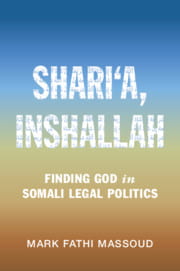
Mark Fathi Massoud. Shari’a, Inshallah: Finding God in Somali Legal Politics. New York: Cambridge University Press, 2021.
Western analysts have long denigrated Islamic states as antagonistic, even antithetical, to the rule of law. Mark Fathi Massoud tells a different story: for nearly 150 years, the Somali people have embraced shari’a, commonly translated as Islamic law, in the struggle for national identity and human rights. Lawyers, community leaders, and activists throughout the Horn of Africa have invoked God to oppose colonialism, resist dictators, expel warlords, and to fight for gender equality – all critical steps on the path to the rule of law. Shari’a, Inshallah traces the most dramatic moments of legal change, political collapse, and reconstruction in Somalia and Somaliland. Massoud upends the conventional account of secular legal progress and demonstrates instead how faith in a higher power guides people toward the rule of law. Read more here.
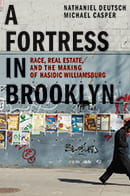
Nathaniel Deutsch and Michael Casper. A Fortress in Brooklyn: Race, Real Estate, and the Making of Hasidic Williamsburg. New Haven, CT: Yale University Press, 2021.
The Hasidic community in the Williamsburg section of Brooklyn is famously one of the most separatist, intensely religious, and politically savvy groups of people in the entire United States. Less known is how the community survived in one of the toughest parts of New York City during an era of steep decline, only to later resist and also participate in the unprecedented gentrification of the neighborhood.
Nathaniel Deutsch and Michael Casper unravel the fascinating history of how a group of determined Holocaust survivors encountered, shaped, and sometimes fiercely opposed the urban processes that transformed their gritty neighborhood, from white flight and the construction of public housing to rising crime, divestment of city services, and, ultimately, extreme gentrification. By showing how Williamsburg’s Hasidim rejected assimilation while still undergoing distinctive forms of Americanization and racialization, Deutsch and Casper present both a provocative counter-history of American Jewry and a novel look at how race, real estate, and religion intersected in the creation of a quintessential, and yet deeply misunderstood, New York neighborhood. Read more here.
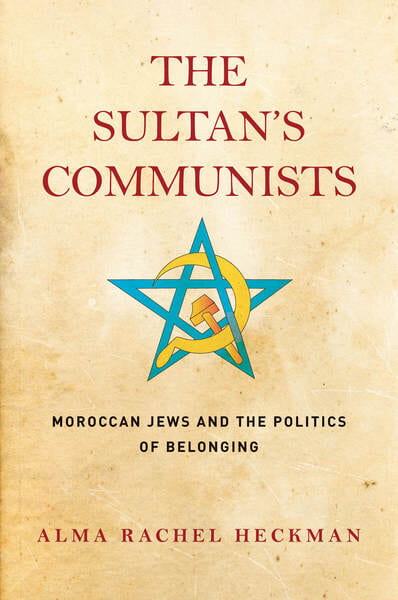
Alma Rachel Heckman. The Sultan’s Communists: Moroccan Jews and the Politics of Belonging. Stanford, CA: Stanford University Press, 2020.
The Sultan’s Communists uncovers the history of Jewish radical involvement in Morocco’s national liberation project and examines how Moroccan Jews envisioned themselves participating as citizens in a newly-independent Morocco. Closely following the lives of five prominent Moroccan Jewish Communists (Léon René Sultan, Edmond Amran El Maleh, Abraham Serfaty, Simon Lévy, and Sion Assidon), Alma Rachel Heckman describes how Moroccan Communist Jews fit within the story of mass Jewish exodus from Morocco in the 1950s and ’60s, and how they survived oppressive post-independence authoritarian rule under the Moroccan monarchy to ultimately become heroic emblems of state-sponsored Muslim-Jewish tolerance.
The figures at the center of Heckman’s narrative stood at the intersection of colonialism, Arab nationalism, and Zionism. Their stories unfolded in a country that, upon independence from France and Spain in 1956, allied itself with the United States (and, more quietly, Israel) during the Cold War, while attempting to claim a place for itself within the fraught politics of the post-independence Arab world. The Sultan’s Communists contributes to the growing literature on Jews in the modern Middle East and provides a new history of twentieth-century Jewish Morocco. Read more here.
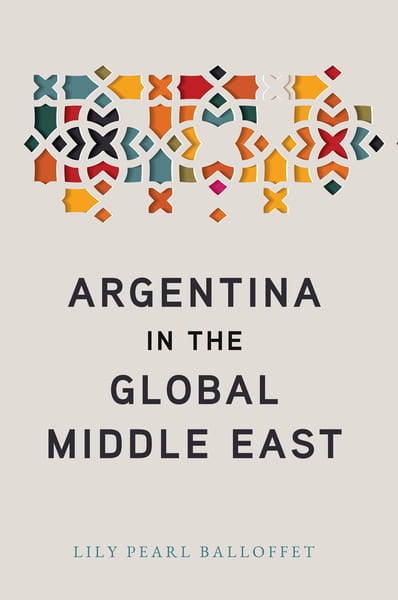
Lily Pearl Balloffet. Argentina in the Global Middle East. Stanford, CA: Stanford University Press, 2020.
Argentina lies at the heart of the American hemisphere’s history of global migration booms of the mid-nineteenth to early twentieth century: by 1910, one of every three Argentine residents was an immigrant—twice the demographic impact that the United States experienced in the boom period. In this context, some one hundred and forty thousand Ottoman Syrians came to Argentina prior to World War I, and over the following decades Middle Eastern communities, institutions, and businesses dotted the landscape of Argentina from bustling Buenos Aires to Argentina’s most remote frontiers.
Argentina in the Global Middle East connects modern Latin American and Middle Eastern history through their shared links to global migration systems. By following the mobile lives of individuals with roots in the Levantine Middle East, Lily Pearl Balloffet sheds light on the intersections of ethnicity, migrant–homeland ties, and international relations. Ranging from the nineteenth century boom in transoceanic migration to twenty-first century dynamics of large-scale migration and displacement in the Arabic-speaking Eastern Mediterranean, this book considers key themes such as cultural production, philanthropy, anti-imperial activism, and financial networks over the course of several generations of this diasporic community. Balloffet’s study situates this transregional history of Argentina and the Middle East within a larger story of South-South alliances, solidarities, and exchanges. Read more here.
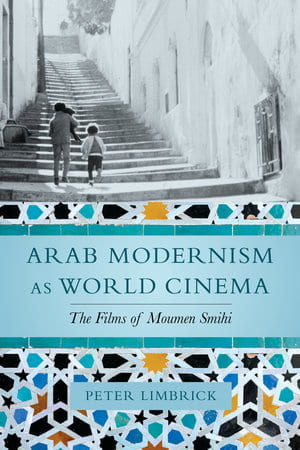
Peter Limbrick. Arab Modernism as World Cinema : The Films of Moumen Smihi. Berkeley, CA: University of California Press, 2020.
Arab Modernism as World Cinema explores the radically beautiful films of Moroccan filmmaker Moumen Smihi, demonstrating the importance of Moroccan and Arab film cultures in histories of world cinema. Addressing the legacy of the Nahda or Arab Renaissance of the nineteenth and early twentieth century when Arab writers and artists reenergized Arab culture by engaging with other languages and societies. Peter Limbrick argues that Smihi’s films take up the spirit of the Nahda for a new age. Examining Smihi’s oeuvre, which enacts an exchange of images and ideas between Arab and non-Arab cultures, Limbrick rethinks the relation of Arab cinema to modernism and further engages debates about the use of modernist forms by filmmakers in the Global South. This original study offers new routes for thinking about world cinema and modernism in the Middle East and North Africa, and about Arab cinema in the world. Read more here.
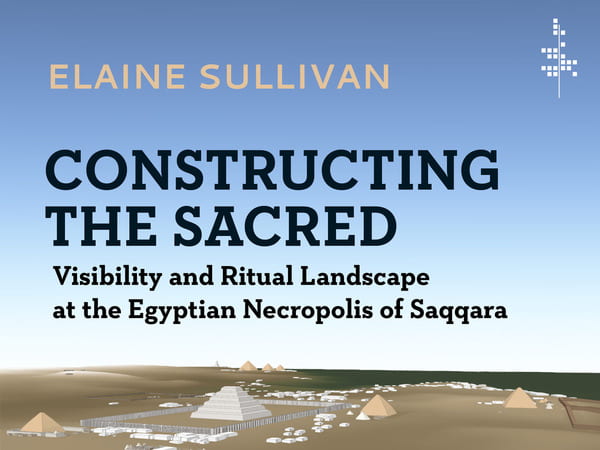
Elaine A. Sullivan. Constructing the Sacred: Visibility and Ritual Landscape at the Egyptian Necropolis of Saqqara. Stanford, CA: Stanford University Press, 2019.
Utilizing 3D technologies, Constructing the Sacred addresses ancient ritual landscape from a unique perspective to examine development at the complex, long-lived archaeological site of Saqqara, Egypt. Sullivan focuses on how changes in the built and natural environment affected burial rituals at the temple due to changes in visibility. Flipping the top-down view prevalent in archeology to a more human-centered perspective puts the focus on the dynamic evolution of an ancient site that is typically viewed as static. Sullivan considers not just individual buildings, but re-contextualizes built spaces within the larger ancient landscape, engaging in materially-focused investigations of how monuments shape community memories and a culturally-specific sense of place, thus incorporating the qualitative aspects of human perception. 3D models promise to have great potential for research in a broad range of artifact- and object-based research, yet current technology does not allow for a robust environment of engaging with complex objects that change over time. This publication is among the first to push the boundaries to include interactive 3D models that can be navigated both spatially and temporally. Read more here.
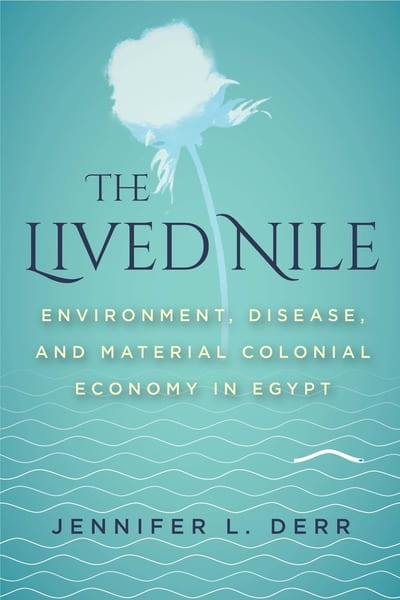
Jennifer L. Derr. The Lived Nile: Environment, Disease, and Material Colonial Economy in Egypt. Stanford, CA: Stanford University Press, 2019.
In October 1902, the reservoir of the first Aswan Dam filled, and Egypt’s relationship with the Nile River forever changed. Flooding villages of historical northern Nubia and filling the irrigation canals that flowed from the river, the perennial Nile not only reshaped agriculture and the environment, but also Egypt’s colonial economy and forms of subjectivity. Jennifer L. Derr follows the engineers, capitalists, political authorities, and laborers who built a new Nile River through the nineteenth and early twentieth centuries. The river helped to shape the future of technocratic knowledge, and the bodies of those who inhabited rural communities were transformed through the environmental intimacies of their daily lives. At the root of this investigation lies the notion that the Nile is not a singular entity, but a realm of practice and a set of temporally, spatially, and materially specific relations that structured experiences of the colonial economy. From the microscopic to the regional, the local to the imperial, The Lived Nile recounts the history and centrality of the environment to questions of politics, knowledge, and the lived experience of the human body itself. Read more here.
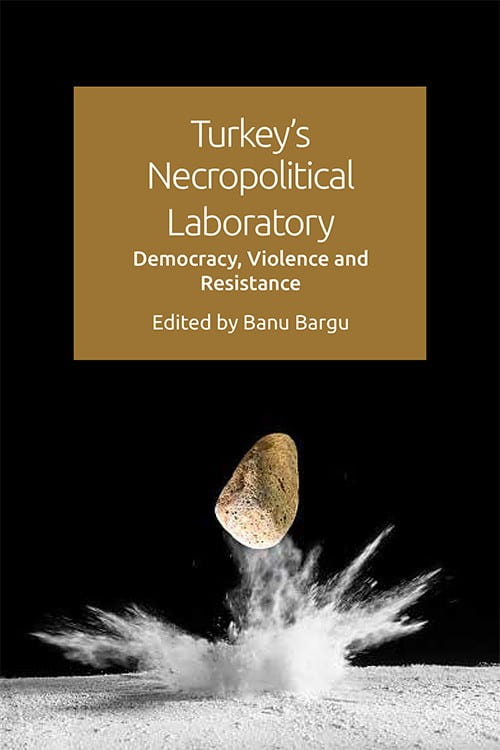
Banu Bargu, Editor. Turkey’s Necropolitical Laboratory: Democracy, Violence and Resistance. Edinburgh University Press, 2019.
- Brings together 11 case studies that take up different forms of violence which collectively shed light on the contradictions and limitations of Turkey’s democracy
- Zooms in on themes such as martyrdom, counterinsurgency warfare, enforced disappearances and conscientious objection; sites such as emergency zones, cemeteries, monuments and borderlands; and institutions such as prisons, courts and the army
- Draws on historical, discursive, and ethnographic approaches
- Gathers contributors from disciplines including political theory, philosophy, anthropology, sociology, history, international relations, gender studies and sexuality studies
- Speaks to the broader research programme on violence in the critical humanities and social sciences
This book makes a strong case that Turkey’s regime and its vicissitudes are dependent on a necropolitical undercurrent. Building on the insights of critical and contemporary theory, the essays address the multiple ways in which lives are brought into the fold of power. Once there, they are subjected to mechanisms of death and destruction, and to modalities of infrastructural violence, strategic neglect and exposure. This produces new forms of impoverishment, inequality and disposability. Read more here.
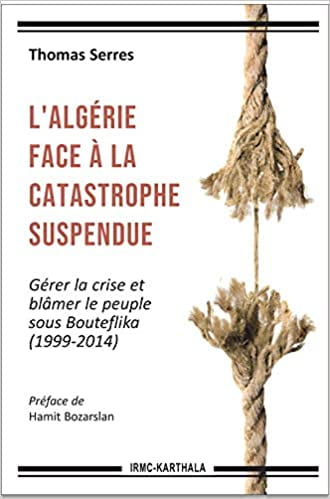
Thomas Serres. Gérer la crise, blâmer le peuple. La catastrophe suspendue dans l’Algérie de Bouteflika. Paris: Karthala-IRMC, 2019.
En combinant les apports de l’observation sociologique et de la théorie critique, ce livre s’efforce de dépasser les fictions qui suggèrent l’existence d’un « Système » omnipotent, impersonnel et corrupteur, en décortiquant les transformations de l’ordre politique algérien au cours des trois premiers mandats d’Abdelaziz Bouteflika. Read more here.
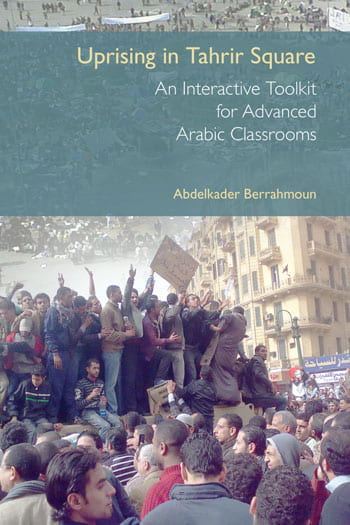
Abdelkader Berrahmoun. Uprising in Tahrir Square: An Interactive Toolkit for Advanced Arabic Classrooms. Equinox Publishing, 2019.
Uprising in Tahrir Square is designed as an engaging contemporary resource for advanced Arabic learners. It immerses language students in the monumental events that unfolded in Cairo, Egypt during the mass youth uprisings of January 2011. Before toppling President Hosni Mubarak’s 30-year rule in February 2011, the Egyptian youth movement had captivated the world and transmitted its message of anger, hope, and change to a global audience. The world watched as more than a million protestors gathered to press for reform, democracy and regime change.
Uprising in Tahrir Square places students of Arabic at the epicenter of these real-life events through a simulated journal project and writing exchange. Students become authors in their own right as they invent personas and speak through the voices of diverse characters who all reside in the vicinity of Cairo’s Tahrir Square. Writing in first-person narrative, students’ journal entries bear witness to the early days of the nascent uprising, through its surprisingly rapid conclusion with Mubarak’s resignation, and the uncertainty of what Egypt’s future may bring. Not only do the invented characters grapple with the uprising’s tragedies and triumphs through their own perspectives, but they also interact with a cast of invented neighbors, using contemporary technology tools, creative drama activities and other approaches. The book’s units trace the actual sequence of the Cairo uprising and intersperse fictional scenarios – providing both historical background and interpretive content.
The structure of Uprising in Tahrir Square supports learning on multiple levels. Students deepen their understanding of the cultural, political and social contexts for Egyptian youth’s historic uprisings, while developing essential Arabic skills. The book’s activities and array of resources are carefully designed to promote listening and reading comprehension, vocabulary development, critical thinking and interpretation, research, peer collaboration, creative writing, and oral language fluency. Students apply essential skills by using the Arabic language in a vital, authentic context. Uprising in Tahrir Square is designed as a springboard for further discussion and study of this compelling time in history. Read more here.
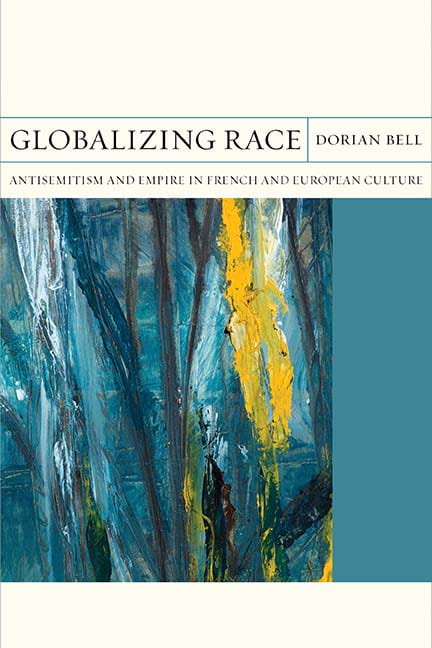
Dorian Bell. Globalizing Race: Antisemitism and Empire in French and European Culture. Evanston, IL: Northwestern University Press, 2018.
Globalizing Race explores how intersections between French antisemitism and imperialism shaped the development of European racial thought. Ranging from the African misadventures of the antisemitic Marquis de Morès to the Parisian novels and newspapers of late nineteenth-century professional antisemites, Dorian Bell argues that France’s colonial expansion helped antisemitism take its modern, racializing form—and that, conversely, antisemitism influenced the elaboration of the imperial project itself. Globalizing Race radiates from France to place authors like Guy de Maupassant and Émile Zola into sustained relation with thinkers from across the ideological spectrum, including Hannah Arendt, Friedrich Nietzsche, Frantz Fanon, Karl Marx, Max Horkheimer, and Theodor Adorno. Engaging with what has been called the “spatial turn” in social theory, the book offers new tools for thinking about how racisms interact across space and time. Among these is what Bell calls racial scalarity. Race, Bell argues, did not just become globalized when European racism and antisemitism accompanied imperial penetration into the farthest reaches of the world. Rather, race became most thoroughly global as a method for constructing and negotiating the different scales (national, global, etc.) necessary for the development of imperial capitalism. As France, Europe, and the world confront a rising tide of Islamophobia, Globalizing Race also brings into fascinating focus how present-day French responses to Muslim antisemitism hark back to older, problematic modes of representing the European colonial periphery. Read more here.
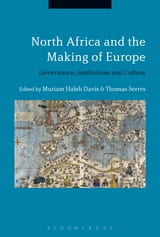
Muriam Davis and Thomas Serres, Editors. North Africa and the Making of Europe: Governance, Institution and Culture. Bloomsbury Academic Publishing, 2018.
This innovative edited collection brings together leading scholars from the USA, the UK and mainland Europe to examine how European identity and institutions have been fashioned though interactions with the southern periphery since 1945. It highlights the role played by North African actors in shaping European conceptions of governance, culture and development, considering the construction of Europe as an ideological and politico-economic entity in the process. Split up into three sections that investigate the influence of colonialism on the shaping of post-WWII Europe, the nature of co-operation, dependence and interdependence in the region, and the impact of the Arab Spring, North Africa and the Making of Europe investigates the Mediterranean space using a transnational, interdisciplinary approach. This, in turn, allows for historical analysis to be fruitfully put into conversation with contemporary politics. The book also discusses such timely issues such as the development of European institutions, the evolution of legal frameworks in the name of antiterrorism, the rise of Islamophobia, immigration, and political co-operation. Students and scholars focusing on the development of postwar Europe or the EU’s current relationship with North Africa will benefit immensely from this invaluable new study. Read more here.
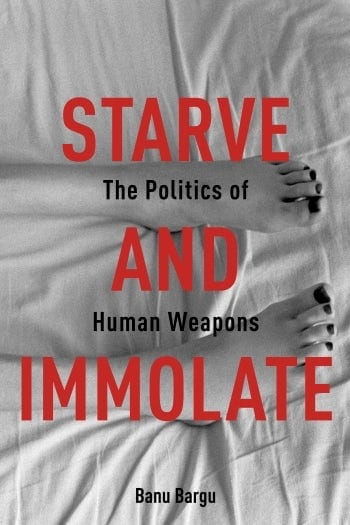
Banu Bargu. Starve and Immolate: The Politics of Human Weapons. New York: Columbia University Press, 2014.
Starve and Immolate tells the story of leftist political prisoners in Turkey who waged a deadly struggle against the introduction of high security prisons by forging their lives into weapons. Weaving together contemporary and critical political theory with political ethnography, Banu Bargu analyzes the death fast struggle as an exemplary though not exceptional instance of self-destructive practices that are a consequence of, retort to, and refusal of the increasingly biopolitical forms of sovereign power deployed around the globe. Bargu chronicles the experiences, rituals, values, beliefs, ideological self-representations, and contentions of the protestors who fought cellular confinement against the background of the history of Turkish democracy and the treatment of dissent in a country where prisons have become sites of political confrontation. A critical response to Michel Foucault’s Discipline and Punish, Starve and Immolate centers on new forms of struggle that arise from the asymmetric antagonism between the state and its contestants in the contemporary prison. Bargu ultimately positions the weaponization of life as a bleak, violent, and ambivalent form of insurgent politics that seeks to wrench the power of life and death away from the modern state on corporeal grounds and in increasingly theologized forms. Drawing attention to the existential commitment, sacrificial morality, and militant martyrdom that transforms these struggles into a complex amalgam of resistance, Bargu explores the global ramifications of human weapons’ practices of resistance, their possibilities and limitations. Read more here.
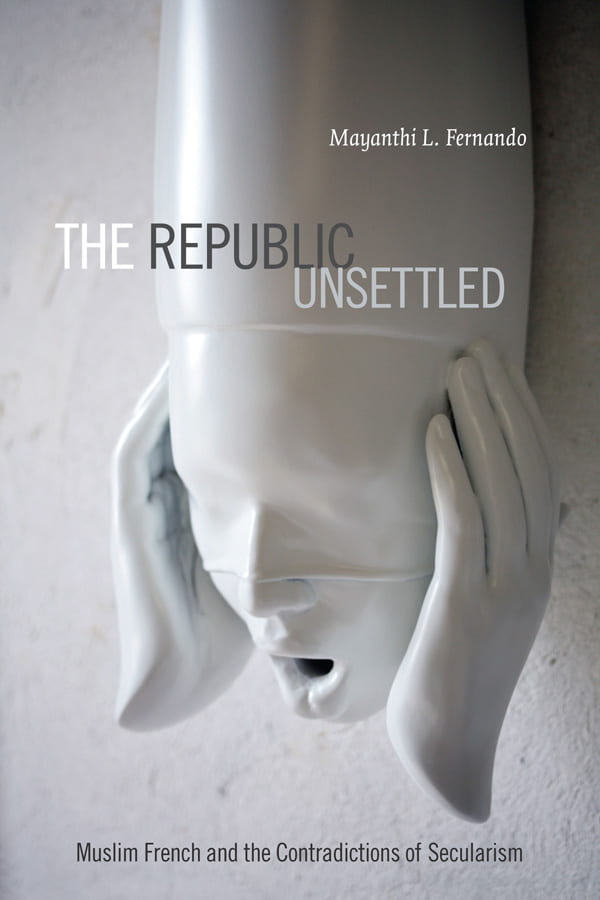
Mayanthi L. Fernando. The Republic Unsettled: Muslim French and the Contradictions of Secularism. Chapel Hill, NC: Duke University Press, 2014.
In 1989 three Muslim schoolgirls from a Paris suburb refused to remove their Islamic headscarves in class. The headscarf crisis signaled an Islamic revival among the children of North African immigrants; it also ignited an ongoing debate about the place of Muslims within the secular nation-state. Based on ten years of ethnographic research, The Republic Unsettled alternates between an analysis of Muslim French religiosity and the contradictions of French secularism that this emergent religiosity precipitated. Mayanthi L. Fernando explores how Muslim French draw on both Islamic and secular-republican traditions to create novel modes of ethical and political life, reconfiguring those traditions to imagine a new future for France. She also examines how the political discourses, institutions, and laws that constitute French secularism regulate Islam, transforming the Islamic tradition and what it means to be Muslim. Fernando traces how long-standing tensions within secularism and republican citizenship are displaced onto France’s Muslims, who, as a result, are rendered illegitimate as political citizens and moral subjects. She argues, ultimately, that the Muslim question is as much about secularism as it is about Islam. Read more here.
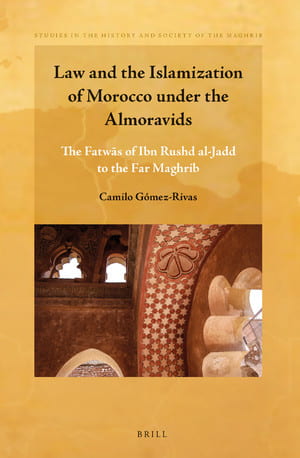
Camilo Gómez-Rivas. Law and the Islamization of Morocco under the Almoravids: The Fatwās of Ibn Rushd al-Jadd to the Far Maghrib. Leiden, Netherlands: Brill, 2014.
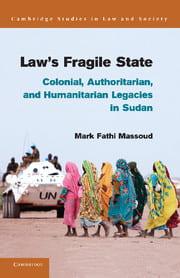
Mark Fathi Massoud. Law’s Fragile State: Colonial, Authoritarian, and Humanitarian Legacies in Sudan. New York: Cambridge University Press, 2014.
How do a legal order and the rule of law develop in a war-torn state? Using his field research in Sudan, Massoud uncovers how colonial administrators, postcolonial governments and international aid agencies have used legal tools and resources to promote stability and their own visions of the rule of law amid political violence and war in Sudan. Tracing the dramatic development of three forms of legal politics – colonial, authoritarian and humanitarian – this book contributes to a growing body of scholarship on law in authoritarian regimes and on human rights and legal empowerment programs in the Global South. Refuting the conventional wisdom of a legal vacuum in failed states, this book reveals how law matters deeply even in the most extreme cases of states still fighting for political stability. Read more here.
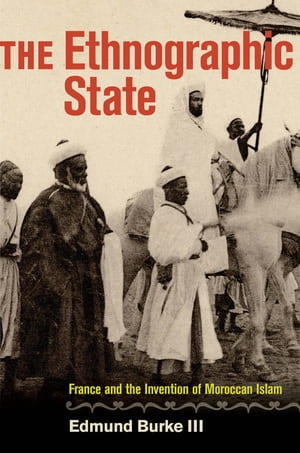
Edmund Burke III. The Ethnographic State: France and the Invention of Moroccan Islam. Berkeley, CA: University of California Press, 2014.
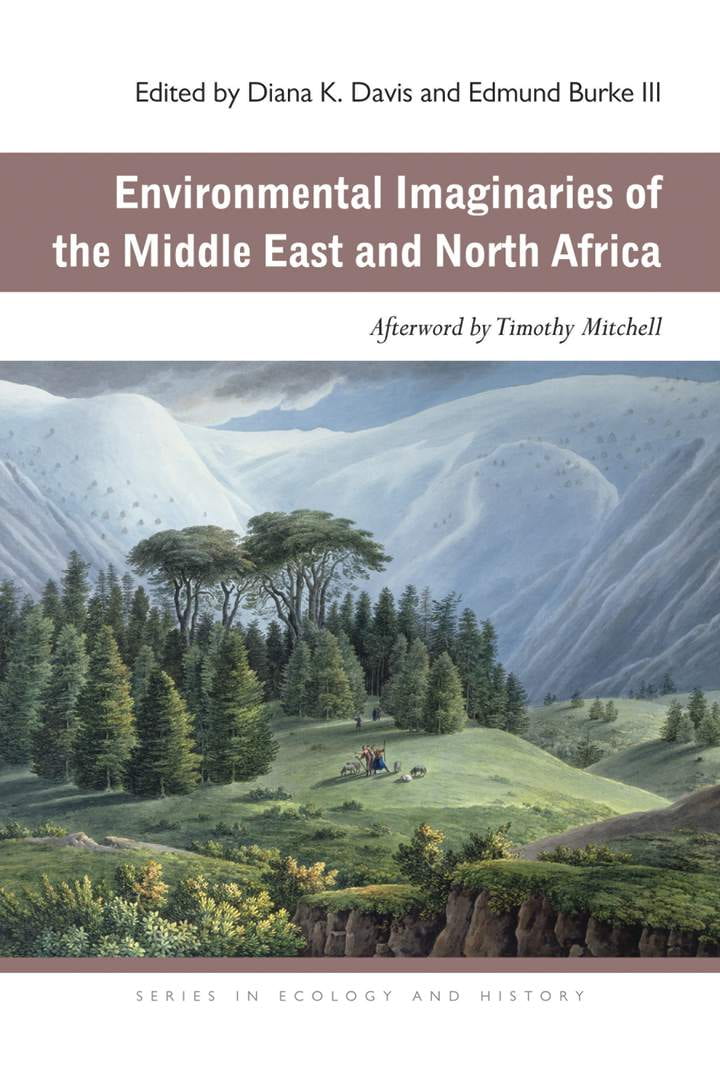
Edmund Burke III and Diana Davis, Editors. Environmental Imaginaries of the Middle East and North Africa. Athens, OH: Ohio University Press, 2013.
The landscapes of the Middle East have captured our imaginations throughout history. Images of endless golden dunes, camel caravans, isolated desert oases, and rivers lined with palm trees have often framed written and visual representations of the region. Embedded in these portrayals is the common belief that the environment, in most places, has been deforested and desertified by centuries of misuse. It is precisely such orientalist environmental imaginaries, increasingly undermined by contemporary ecological data, that the eleven authors in this volume question. This is the first volume to critically examine culturally constructed views of the environmental history of the Middle East and suggest that they have often benefitted elites at the expense of the ecologies and the peoples of the region. The contributors expose many of the questionable policies and practices born of these environmental imaginaries and related histories that have been utilized in the region since the colonial period. They further reveal how power, in the form of development programs, notions of nationalism, and hydrological maps, for instance, relates to environmental knowledge production. Read more here.
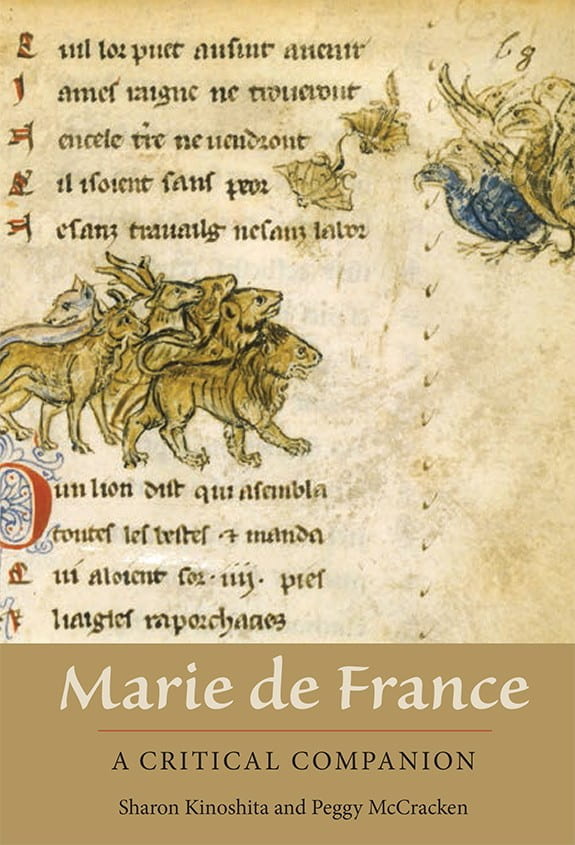
Sharon Kinoshita and Peggy McKracken. Marie de France: A Critical Companion. Boydell and Brewer, 2012.
Marie de France is the author of some of the most influential and important works to survive from the middle ages; arguably best-known for her Lais, she also translated Aesop’s Fables (the Ysopë), and wrote the Espurgatoire seint Patriz (St Patrick’s Purgatory), based on a Latin text. The aim of this Companion is both to provide information on what can be gleaned of her life, and on her poetry, and to rethink standard questions of interpretation, through topics with special relevance to medieval literature and culture. The variety of perspectives used highlights both the unity of Marie’s oeuvre and the distinctiveness of the individual texts. After situating her writings in their Anglo-Norman political, linguistic, and literary context, this volume considers her treatment of questions of literary composition in relation to the circulation, transmission, and interpretation of her works. Her social and historical engagements are illuminated by the prominence of feudal vocabulary, while her representation of movement across different geographical and imaginary spaces opens a window on plot construction. Repetition and variation are considered as a narrative technique within Marie’s work, and as a cultural practice linking her texts to a network of twelfth-century textual traditions. The conclusion, on the posterity of her oeuvre, combines a consideration of manuscript context with the ways in which later authors rewrote Marie’s works. Read more here.
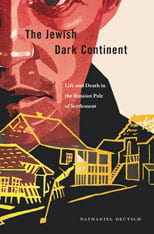
Nathaniel Deutsch. The Jewish Dark Continent: Life and Death in the Russian Pale of Settlement. Cambridge, MA: Harvard University Press, 2011.
At the turn of the twentieth century, over forty percent of the world’s Jews lived within the Russian Empire, almost all in the Pale of Settlement. From the Baltic to the Black Sea, the Jews of the Pale created a distinctive way of life little known beyond its borders. This led the historian Simon Dubnow to label the territory a Jewish “Dark Continent.” Just before World War I, a socialist revolutionary and aspiring ethnographer named An-sky pledged to explore the Pale. He dreamed of leading an ethnographic expedition that would produce an archive—what he called an Oral Torah of the common people rather than the rabbinic elite—which would preserve Jewish traditions and transform them into the seeds of a modern Jewish culture. Between 1912 and 1914, An-sky and his team collected jokes, recorded songs, took thousands of photographs, and created a massive ethnographic questionnaire. Consisting of 2,087 questions in Yiddish—exploring the gamut of Jewish folk beliefs and traditions, from everyday activities to spiritual exercises to marital intimacies—the Jewish Ethnographic Program constitutes an invaluable portrait of Eastern European Jewish life on the brink of destruction. Nathaniel Deutsch offers the first complete translation of the questionnaire, as well as the riveting story of An-sky’s almost messianic efforts to create a Jewish ethnography in an era of revolutionary change. An-sky’s project was halted by World War I, and within a few years the Pale of Settlement would no longer exist. These survey questions revive and reveal shtetl life in all its wonder and complexity. Read more here.
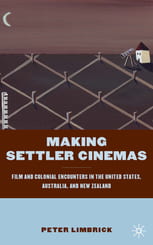
Peter Limbrick. Making Settler Cinemas: Film and Colonial Encounters in the United States, Australia, and New Zealand. Palgrave MacMillan, 2010.
Through a shrewd analysis of the historical experience of imperialism and settler colonialism, Limbrick draws new conclusions about their effect on cinematic production, distribution, reception and filmic discourse. Read more here.
